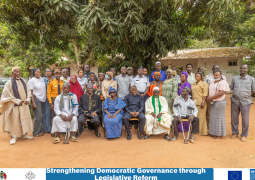
The reminder by the rights body came on the side-line of its recently launched index, which presented an overview of the level of commitment of African states in ensuring that pregnant girls and adolescents successfully continue their education.
“All 55 member states of the African Union have adopted obligations to ensure inclusive and quality education for every student through the adoption of the African Union Agenda 2063 and the United Nations Sustainable Development Goals,” the rights body stated.
“African Governments have also made commitments to end child marriage, promote sexual and reproductive rights, and tackle teenage pregnancy. Further, all AU states have a duty to protect girls from exclusion in education.”
“Most African countries have frameworks that explicitly guarantee adolescent girls’ right to stay in school during pregnancy and motherhood. At least 38 African countries have adopted laws, policies, or corresponding measures that ensure that pregnant girls can resume their education after giving birth.”
However, the rights body added that, many countries lack adequate policies or have adopted punitive or discriminatory measures against adolescent mothers that serve to deny girls the right to complete primary and secondary education.
“Numerous education systems still choose to punish girls for pregnancy by denying them any kind of education, forcing them to choose poorer quality education in alternative settings away from their own peers or stigmatizing them when they fight to stay in school.
“Some African countries that lack policies related to teenage pregnancies in schools also impose “morality” based penalties and punishments on girls who are reported to have had sexual relationships outside of marriage. Girls who become pregnant are not only exposed to public ridicule and social stigma, but may also be criminally charged for non-marital sex, indecency, or adultery.”




